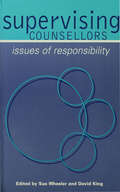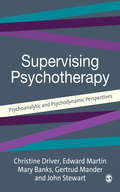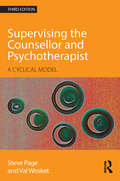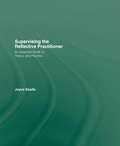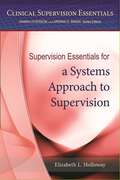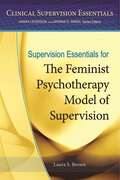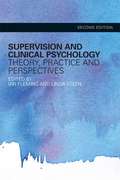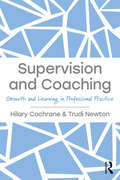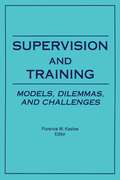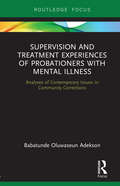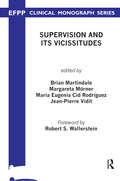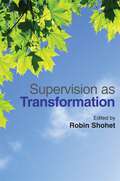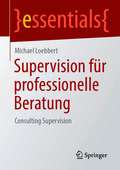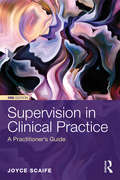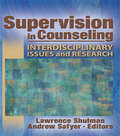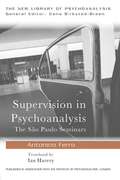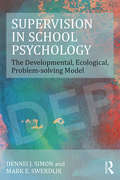- Table View
- List View
Supervisie als proces: Een gids voor de praktijk
by Peter Daansen Greet Vanaerschot Nelleke NicolaiDit handboek biedt kaders én concrete handvatten voor de supervisor (in spe). De nadruk ligt op het leren faciliteren van het supervisieproces. Het laat zien hoe je als supervisor supervisanten kunt helpen psychotherapeutische en professionele vaardigheden te verwerven en integreren, zoals het opbouwen van een werkrelatie, het gepast en gefaseerd spiegelen en interveniëren, het toepassen van een behandelprotocol afgestemd op de cliënt, en het reflecteren op het eigen professioneel handelen. Supervisie als proces bestaat uit twee delen. Het eerste deel biedt een algemene oriëntatie op het werkveld van supervisie. Begripsbepaling en positionering van supervisie, rollen, taken, verantwoordelijkheden en competenties van de supervisor, alsook het supervisieproces komen aan de orde . Deel twee focust op de praktijk van supervisie in de verschillende fasen van het supervisieproces. Hoe zet je als supervisor de supervisant aan het werk? Hoe begeleid je de supervisant door zijn leercyclus? Welke tools kan je hierbij inzetten? Wat doe je als een supervisieproces vastloopt? Hoe vergroot je supervisants bewustzijn van onbewuste interferende processen en vormen van automatische coping? Wat zijn de aandachtspunten voor specifieke behandelcontexten? Dit boek is bestemd voor supervisoren en zij die daartoe in opleiding zijn. Het boek kan onder andere gebruikt worden binnen de opleidingen tot psychotherapeut, gz-psycholoog, klinisch psycholoog, klinisch neuropsycholoog, klinisch orthopedagoog en psychiater.
Supervising Counsellors: Issues of Responsibility
by David King Sue WheelerSupervising Counsellors is a practical and insightful guide to the responsibilities facing all those involved in supervising practitioners and trainees. Drawing together contributions and new research from those at the forefront of supervisory practice, this book makes essential reading for both qualified and trainee supervisors. Part One defines the supervisor′s clinical, legal and ethical responsibilities, and clearly sets out the law and professional codes relating to supervision. Part Two examines issues that arise for supervisors working in different contexts: organizations; training; primary care; and some of the wider issues concerning supervision, and highlights in particular the expectations of supervisees and the role of supervisors in ensuring that clients are not discriminated against.
Supervising Psychotherapy: Psychoanalytic and Psychodynamic Perspectives
by John Stewart Dr Gertrud Mander Mr Edward Martin Mrs Christine Driver Mrs Mary Banks`I enjoyed and was challenged by reading this book, and learned from, and with, it. It is useful for browsing and for a deeper exploration of chosen topics. It offers a healthy enrichment for all who have a dynamic interest in the external and internal supervisory relationship. I warmly recommend it' - British Journal of Psychotherapy `This book is thoughtful, scholarly and very well written. The content is well set out in separate sections making it eminently readable. It is solidly based on psychoanalytic theory highlighting the transformational impact of a supervisory process that is embedded in the dyadic relationships formed by the supervised patient - supervisee and the supervisee - supervisor. This book has greatly enriched my understanding of the supervisory process and the organizational life in which it transpires. It will be a richly informative resource for all involved in supervisory work' - Gemma Corbett, Self & Society Based on the view that supervision is in itself both a developmental and a therapeutic process, Supervising Psychotherapy examines the fundamental knowledge needed to become a skilled and effective supervisor. Written by a highly experienced team of trainers and supervisors, the book explores the triangular relationship which exists between supervisor, therapist and the absent patient or client. It describes in depth the complex dynamics which characterise this relationship, while avoiding the pitfalls of unconsciously colluding with or controlling the supervisee. In supervising the practice of others, supervisors must draw not only on their experience as a therapist, but also on a firm understanding of how people learn and of how organisational factors can impinge on therapy and supervision. The book examines the interface between supervision and teaching and between supervision and organisation and offers guidance in relation to: · unconscious processes in supervision · the supervisory triangle · supervising groups · supervising short term therapy · ethical practice · timing and ending of supervision. For those who are in the process of becoming supervisors and for those who already practising, Supervision in Psychotherapy is an enlightening and thought-provoking read. Mary Banks, Christine Driver, Gertrud Mander, Edward Martin and John Stewart are all trained supervisors who have been or are currently involved in training others in supervision. All are members of the British Association for Psychoanalytic and Psychodynamic Supervision (BAPPS).
Supervising Student Independence: A Research-based Approach to Academic Supervision in Practice
by Maria Zackariasson Jenny MagnussonThis open access book examines the supervision of undergraduate degree projects, with a particular focus on how supervision may contribute to developing student independence and academic literacies. Based on an extensive research project, it uses examples from focus group interviews as well as actual supervision situations, taken from different higher education programmes at several universities in Sweden and Russia. The authors discuss issues such as supervisors’ perceptions and understandings of student independence, the relationship between supervisor and student, the significance of emotions in the supervision process, different supervision tools to foster independence, and the supervisor’s role not only as a guide and helper but also as an assessor of the students’ work. The book will appeal to scholars within the field of teaching and learning in higher education, as well as those from other disciplines who are interested in developing their own supervision practice.
Supervising and Being Supervised: A Practice in Search of a Theory
by Jan Wiener Richard Mizen Jenny DuckhamSupervision is an essential constituent of analytic and psychotherapy training and a crucial part of ongoing professional development for all practitioners. In spite of this, little formal theory about supervision has been developed and, for the most part, learning to supervise has progressed using a simple apprenticeship model. Supervising and Being Supervised aims to rectify this situation. Jan Wiener, Richard Mizen and Jenny Duckham draw together contributions from a number of experienced Jungian analysts who supervise to explore key aspects of the supervisory experience with the aim of developing a theory for analytically-based work. Part One explores the nature of the supervisor-supervisee relationship, Part Two looks at a number of the settings and applications of supervision and Part Three examines problems that might occur in supervision. In the fourth and final part, and drawing on the previous chapters, the focus turns specifically to the challenges of developing a clear theory of supervision.
Supervising the Counsellor and Psychotherapist: A cyclical model
by Val Wosket Steve PageSupervising the Counsellor and Psychotherapist considers how to meet the supervision needs of trainee and experienced counsellors, psychotherapists and other helping professionals using an integrative approach that will appeal to practitioners from a broad range of backgrounds and theoretical persuasions. The book charts the development of the supervisor as he or she moves through making the transition from therapist to supervising the work of others and includes consideration of the advanced competencies required to supervise experienced practitioners. This third edition brings a number of contemporary perspectives to a well-known and widely respected core text for the training and development of supervisors. The Cyclical Model at the heart of the book has established its relevance in the UK as one of the best known frameworks for teaching and learning the steps and stages of supervision. All chapters in this new edition have been extensively revised and updated, and key elements include: - Two brand new chapters on deepening supervision practice and moving beyond supervising counsellors and psychotherapists - Updates on recent developments in supervision, including research outcomes, the use of technology and supervising short-term work - Creativity, play and the use of metaphor and imagery in supervision - Developing the use of self through relational supervision. Supervising the Counsellor and Psychotherapist is a key text for trainee and experienced supervisors of counsellors and psychotherapists, those who train supervisors, and supervisees wishing to better understand the supervisory process.
Supervising the Reflective Practitioner: An Essential Guide to Theory and Practice
by Joyce ScaifeDevelopment as a reflective practitioner has become an essential quality for practitioners in the fields of health, education and social care. Supervising the Reflective Practitioner provides guidance for supervisors, focusing on what they can do to facilitate the development of reflective practice in supervisees. This book contains a wide range of practical examples including personal accounts and illustrations. Topics covered include: what is reflective practice and why is it important now? how reflective practice connects with personal and professional development key issues in supervising reflective practice methods that can be used in supervision. This accessible book will be of great interest to both supervisors and supervisees who practice clinically in a range of professions, including applied psychology, counselling, psychotherapy, psychiatry and nursing. It will also be useful for professionals working in education, health, and social care who want to support supervisees in the development of reflective practice.
Supervision Essentials for a Systems Approach to Supervision (Clinical Supervision Essentials Series)
by Elizabeth L. HollowayA systems approach to supervision conceptualizes the supervisory relationship as consisting of several key dimensions, or systems, which interact in subtle ways across various contexts. These systems include the client, the trainee, the supervisor, the functions and learning tasks in supervision, and the professional institution in which the supervision process is taking place. This book demonstrates the various roles supervisors play, from monitor and advisor, to role model, consultant, and mentor, and offers clear, compelling demonstrations of competencies including counseling skills, case conceptualization, ethical practice, intra and interpersonal awareness, and self-evaluation.
Supervision Essentials for the Feminist Psychotherapy Model of Supervision (Clinical Supervision Essentials Series)
by Laura S. BrownWhile feminist therapy has grown in stature and recognition in the last few decades, comparatively little has been written about supervision and consultation from a feminist standpoint. In this book, the latest in the Clinical Supervision Essentials series from APA Books, Dr. Laura Brown remedies this deficit by presenting a theoretically-grounded, yet practical approach to supervision based on the principles of feminist psychotherapy. This volume offers a framework for translating feminist therapy constructs — including recognizing the impact of systemic hierarchies, and thinking critically about dominant cultural norms in the practice of psychotherapy — into the supervision setting. Incorporating practices derived from multicultural, queer, and other critical psychologies, feminist therapy supervision challenges trainees and supervisors alike to engage with difficult questions about the presence of bias, and ways in which power distributes itself in the context of education, psychotherapy, and supervision itself. Includes a synthesis of the literature on feminist therapy and theory, as well as case examples and practical advice for resolving common supervision problems. The book also offers close analyses of the author's consulting session documented in the DVD Feminist Therapy Supervision, also available from APA books.
Supervision In Early Childhood Education: A Developmental Perspective
by Joseph J. Caruso M. Temple FawcettEvery early care and education program deserves a qualified and competent supervisor. This pioneering text continues to address the special needs of administrators and staff to help them expand and improve their supervisory skills. The first to provide guidelines and practical suggestions for staff training and development in early childhood settings, this classic volume is still the best choice for those supervising staff from a wide variety of educational and cultural backgrounds.
Supervision and Clinical Psychology: Theory, Practice and Perspectives
by Ian Fleming Linda SteenIncreased attention is now being paid to the role of supervision in both pre-qualification and post-qualification practice in clinical psychology in the UK. This definitive text addresses the issues of central concern to supervisors in clinical psychology. Senior trainers and clinicians draw on relevant research and their own experience, covering:* historical development of supervision and a review of worldwide literature on supervision* supervisory and therapy models* maximizing supervisory resources* supervisory training and effectiveness* cultural and gender issues in supervision* measuring the effectiveness of supervision* future perspectives for supervision in clinical psychology. Supervision and Clinical Psychology provides practical advice essential for clinical psychology supervisors, as well as those in psychiatry, social work and psychotherapy.
Supervision and Clinical Psychology: Theory, Practice and Perspectives
by Ian Fleming and Linda SteenWhat are the developments influencing supervision in clinical psychology? Supervision is crucial to good professional practice and an essential part of training and continuing professional development. This second edition of Supervision and Clinical Psychology has been fully updated to include the recent developments in research, policy and the practice of supervision. With contributions from senior trainers and clinicians who draw on both relevant research and their own experience, this book is rooted in current best practice and provides a clear exposition of the main issues important to supervision. New areas of discussion include: the impact of the recent NHS policy developments in supervisor training practical aspects of supervision a consideration of future trends. Supervision and Clinical Psychology, Second Edition is essential reading for clinical psychology supervisors as well as being invaluable to those who work in psychiatry, psychotherapy and social work.
Supervision and Coaching: Growth and Learning in Professional Practice
by Trudi Newton Hilary CochraneWhat is supervision, and what is distinctive about supervision for coaches? This book has a dual purpose: to explore the value of supervision to both giver and receiver in a transformative relationship, and to offer practical guidance for both beginning and experienced supervisors. In Supervision and Coaching, Hilary Cochrane and Trudi Newton create a story of supervision, beginning with a challenge: how can we find an understanding of what happens in supervision, and what is it that we do that enables learning in this relationship to be both a source of professional growth and personal development? The authors identify what goes on in the process of supervision, whatever the field of application, and look at the role of being a supervisor as separate and different from being a master practitioner or mentor. With clarity and through real-life examples, the book explores the relationship and the developmental impact of supervision, using transactional analysis and other models to understand and discuss its psychological basis. Supervision and Coaching includes current theories of adult learning and sections on creating effective contracts, supervision with groups and working as an external supervisor for internal coaches. Combining practical guidance for both beginning and more experienced supervisors with reflection on the underpinning 'roots' of supervision, Supervision and Coaching will be an essential resource for coaches in practice and in training, coach supervisors and other people-work professionals working in a supervisory role.
Supervision and Training: Models, Dilemmas, and Challenges
by Florence KaslowChallenging methods of training, consultation, and supervision--predicated on different ideas about how people learn most effectively--are highlighted in this exceptional volume. Distinguished educator Florence W. Kaslow has compiled new concepts and state-of-the-art approaches that greatly enhance our understanding of the process whereby good professionals become better professionals. Both direct and indirect training methodologies are discussed, and a variety of dynamic, behavioral, and eclectic approaches to the supervision of individual, group, and family therapies are described.
Supervision and Treatment Experiences of Probationers with Mental Illness: Analyses of Contemporary Issues in Community Corrections (Advances in Mental Health Research)
by Babatunde AdeksonEmerging from a qualitative research study on the rehabilitation experiences of adult male probationers with mental health illness, this book describes the treatment and rehabilitation experiences of these individuals and contextualizes their experiences within the landscape of mental health treatment in the United States. Often underserved in outpatient community support programs, probationers with mental health illness (PMIs) face stigma and obstacles in seeking mental health treatment and rehabilitation. Examining the lived experiences of both PMIs and their probation officers, this book offers insights into the study of stigma as it relates to probationers and the work of probation officers in furthering treatment and rehabilitation options for PMIs.
Supervision and its Vicissitudes (The EFPP Monograph Series)
by Brian MartindaleThis book is primarily concerned with the application of psychoanalytic ideas to work in the public sector. It largely deals with the type of supervision work with individuals, teams, and institutions that will often be in demand and useful in the public sector.
Supervision as Transformation: A Passion for Learning
by Michael Carroll Richard Olivier Mary Creaner Ann Rowe Fiona Adamson Robin Shohet Joan Wilmot Judy Ryde Ben Fuchs Christina Breene Nicola CoombeSupervision provides a positive space for compassion, inquiry, reflection, and above all development. The chapters in this book are written from a wide range of perspectives, all of which take a practical approach to supervision and show how transformative it can be when approached in the right way. Contributions range from explorations of supervision as a journey of life-long learning and its place at the heart of practice to chapters on faith, transformation, dealing with feelings, and working with asylum seekers and refugees. The multidisciplinary approach covers much ground not previously touched upon, and every contribution demonstrates just how powerful and transformational passionate supervision has the potential to be. This book will be an invaluable resource for anyone working in the helping professions, for whom supervision is an integral part of their work.
Supervision auf dem Prüfstand: Wirksamkeit, Forschung, Anwendungsfelder, Innovation
by Brigitte Schigl Claudia Höfner Noah A. Artner Katja Eichinger Claudia B. Hoch Hilarion G. PetzoldZum ersten Mal wird mit diesem Band die internationale Supervisionsliteratur und der aktuelle Forschungsstand erschlossen, woraus sich Anregungen für die weitere Entwicklung in Theorie, Forschung und Methodik ergeben. In der kritischen Bestandsaufnahme und durch weiterführende Vorschläge für eine künftige Arbeit ist mit diesem Buch ein bedeutender Beitrag für die Entwicklung der Supervision gegeben.
Supervision für Mediatorinnen und Mediatoren: Qualitätssicherung durch Beratung und Begleitung (essentials)
by Oliver SporréSupervision ist ein wichtiger Baustein zur Qualitätssicherung, sowohl in der Ausbildung als auch in der täglichen Arbeit der Mediatoren. Da für die Supervision keine feststehenden Regeln und Abläufe bestehen, gibt es in der Praxis unterschiedliche Erscheinungsformen. Im Mittelpunkt dieses essentials steht die mediationsanaloge Supervision, die Ähnlichkeiten mit den Phasen einer Mediation aufweist und deshalb für Mediatoren gut geeignet ist. Unter Anleitung eines Supervisors entwickeln Mediatoren an einem dargestellten Fall in einer Gruppe Lösungsoptionen für berufliche Fragestellungen und Herausforderungen, die anschließend nach eigener Auswahl und Entscheidung in die Praxis umgesetzt werden können.
Supervision für professionelle Beratung: Consulting Supervision (essentials)
by Michael LoebbertDieses essential ist eine Handreichung für Menschen, die ihre Beratungstätigkeit für ihre Klientinnen und Klienten in der Management- und Organisationsberatung, Sozialberatung, berufliche Beratung und im Coaching noch erfolgreicher gestalten wollen. Es geht um die Verbesserung von Beratung als professionelle Dienstleistung. Konzepte und Methoden der Supervision von kritischen Erfolgsfaktoren und der Psychodynamik von Beratung werden dargestellt.
Supervision in Clinical Practice: A Practitioner's Guide
by Joyce ScaifeThis fully updated edition of Supervision in Clinical Practice: A Practitioner’s Guide is packed with practical examples from personal and professional experience. Since the publication of the first two editions, health and social care organisations have become increasingly risk averse, resources more strained, and moves have been made towards stifling levels of clinical governance. In this edition Joyce Scaife counters the idea of supervision as a constraint and challenges some of the thinking associated with ‘evidence-based’ practice when this focuses on what can be easily measured rather than what matters. Joyce Scaife explores frequently encountered dilemmas including: How can supervisors facilitate learning? What are the ethical bases of supervision? What helps to create and maintain an effective working alliance? How can supervisors balance management and supervision roles? How can supervisors work equitably in an increasingly diverse and pluralistic world? Supervision in Clinical Practice remains an indispensable text for supervisors and supervisees who practice clinically in a range of professions, including applied psychology, counselling, psychotherapy, psychiatry, nursing and social work.
Supervision in Counseling: Interdisciplinary Issues and Research
by Lawrence Shulman Andrew SafyerA cross-disciplinary look at the latest research and effective approachesClinical supervision is crucial for learning and provides valuable support and evaluation of expertise and knowledge regardless of the discipline. Supervision in Counseling: Interdisciplinary Issues and Research explores the latest conceptual and empirical research in the pursuit of effective education in counseling across a variety of disciplines. Field instruction and clinical supervision issues are addressed in social work, psychology, counseling and counselor education, nursing, and school psychology. Core elements are examined, including the development of the supervisor-supervisee working alliance and the parallel process in supervision.Supervision in Counseling: Interdisciplinary Issues and Research takes you beyond the standard narrow view of clinical supervision within a particular discipline, broadly focusing on research and practices that has value in all disciplines. Research and developments on organizational matters, ethical issues, legal issues, evaluation, relationship issues, models of supervision, and other developments are discussed in detail. The book includes helpful tables and figures and is extensively referenced.Topics in Supervision in Counseling: Interdisciplinary Issues and Research include: major developments in clinical supervision over the years a review of research literature in clinical supervision in counseling the working relationship between supervisor and practitioner challenges in remaining current in clinical supervision overview of literature on supervision in psychology clinical supervision as signature pedagogy for the mental health professions clinical supervision in nursing-inside and outside of the United States research on field instruction in social work much more Supervision in Counseling: Interdisciplinary Issues and Research is an important resource for anyone in the field of clinical supervision in various disciplines, such as social work, psychology, counseling and counselor education, nursing, and school psychology.
Supervision in Psychoanalysis and Psychotherapy: A Case Study and Clinical Guide
by Diana ShmuklerSupervision in Psychoanalysis and Psychotherapy demonstrates why supervision is an essential component of any psychoanalytic or therapeutic work. Drawing on Winnicott and rich clinical material, and featuring work with Patrick Casement, this book provides new guidance on psychodynamic supervision and explores how its skilful use can have a significant effect on the outcome of such work, enabling the practitioner to rethink their theoretical approach, and thereby view issues differently in the clinical setting. Built around the case study of a challenging but successful long term individual therapy, Supervision in Psychoanalysis and Psychotherapy examines how clinicians can become ‘stuck’ in their work with certain patients, struggling to find a way to get through to them. Diana Shmukler brings together a fascinating combination of various perspectives, detailing the patient’s own words, the therapists’ views and reflections and the effect of a brief introduction to Art Therapy, whilst underlining the power and impact, both theoretically and practically, of using a different approach in supervision. Shmukler superbly integrates theory and practice, underlining the validity of a two-person psychology and the therapeutic relationship, whilst also illustrating the centrality of both participant’s commitment to, and belief in, the process of therapy. Importantly, the book provides a clinical example in which the subjectivities of all the participants are shown to be clearly central to the work. Shmukler underlines the significance of supervision to complex cases, even that of a highly experienced therapist. Supervision in Psychoanalysis and Psychotherapy will appeal to psychoanalysts and psychotherapists, students and trainees in integrative psychotherapy, counsellors and psychiatrists, as well as patients seeking help for deep seated issues.
Supervision in Psychoanalysis: The São Paulo Seminars (The New Library of Psychoanalysis)
by Antonino FerroThis book originates from a series of clinical supervisions that were held at the Sao Paulo Institute of Psychoanalysis by Antonino Ferro. Supervision in Psychoanalysis: The Sao Paulo Seminars reproduces the dialogues in the seminars that followed these supervisions in their entirety. The transcripts of eight supervised clinical sessions along with the author’s comments allows the reader to: see the different styles of the presenting analysts first hand understand the evaluation of Bion’s thinking as developed by the author With detailed exposure of clinical sessions, their supervision and clarification of the theoretical model of the supervisor, this book will be of interest to psychologists, psychotherapists and psychoanalysts
Supervision in School Psychology: The Developmental, Ecological, Problem-solving Model
by Mark E. Swerdlik Dennis J. SimonSupervision is a core professional competency requiring specific training for the benefit of supervisees, clients, and the profession. Supervision in School Psychology: The Developmental, Ecological, Problem-solving Model examines specific factors that contribute to successful supervision in school psychology, including the integration of a developmental process of training, the ecological contexts that impact practice, and evidence-based problem-solving strategies. Written for graduate students, researchers, and professionals in the field of school psychology, this book provides thorough, specific, and immediately applicable methods and principles for supervisory practice. Featuring a diverse set of pedagogical tools, Supervision in School Psychology is an important resource for navigating the distinct challenges specific to the demanding and diverse core competencies associated with supervision in school-based settings.

